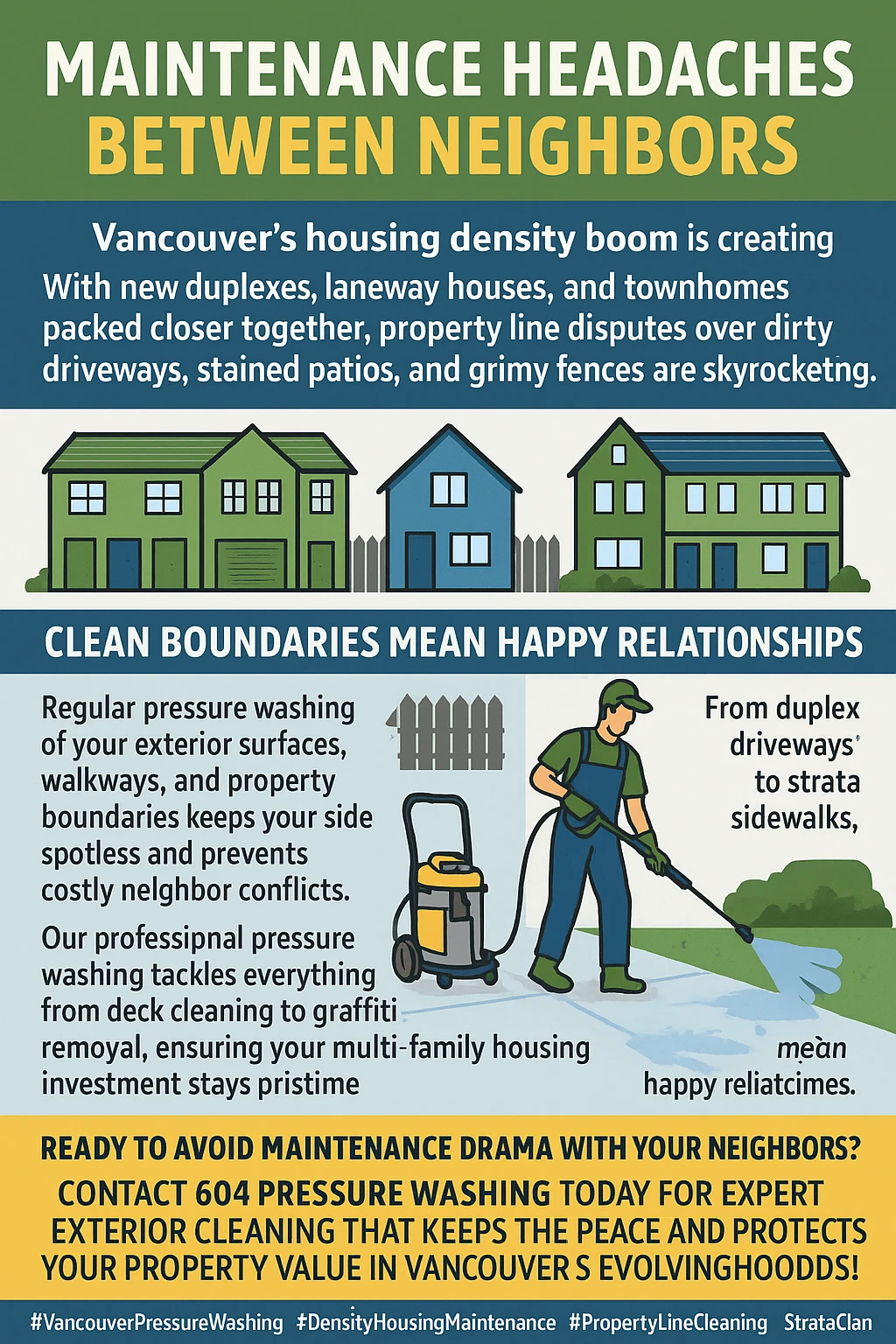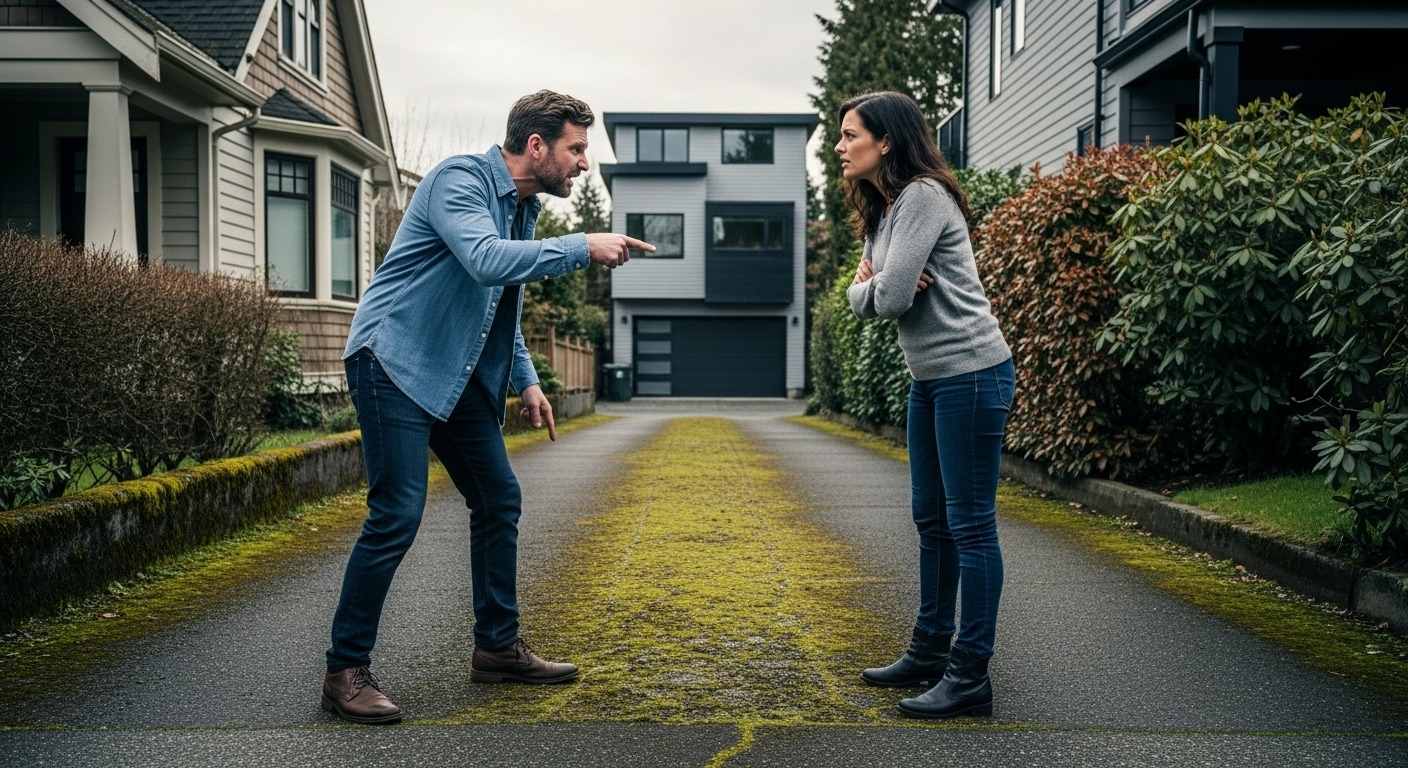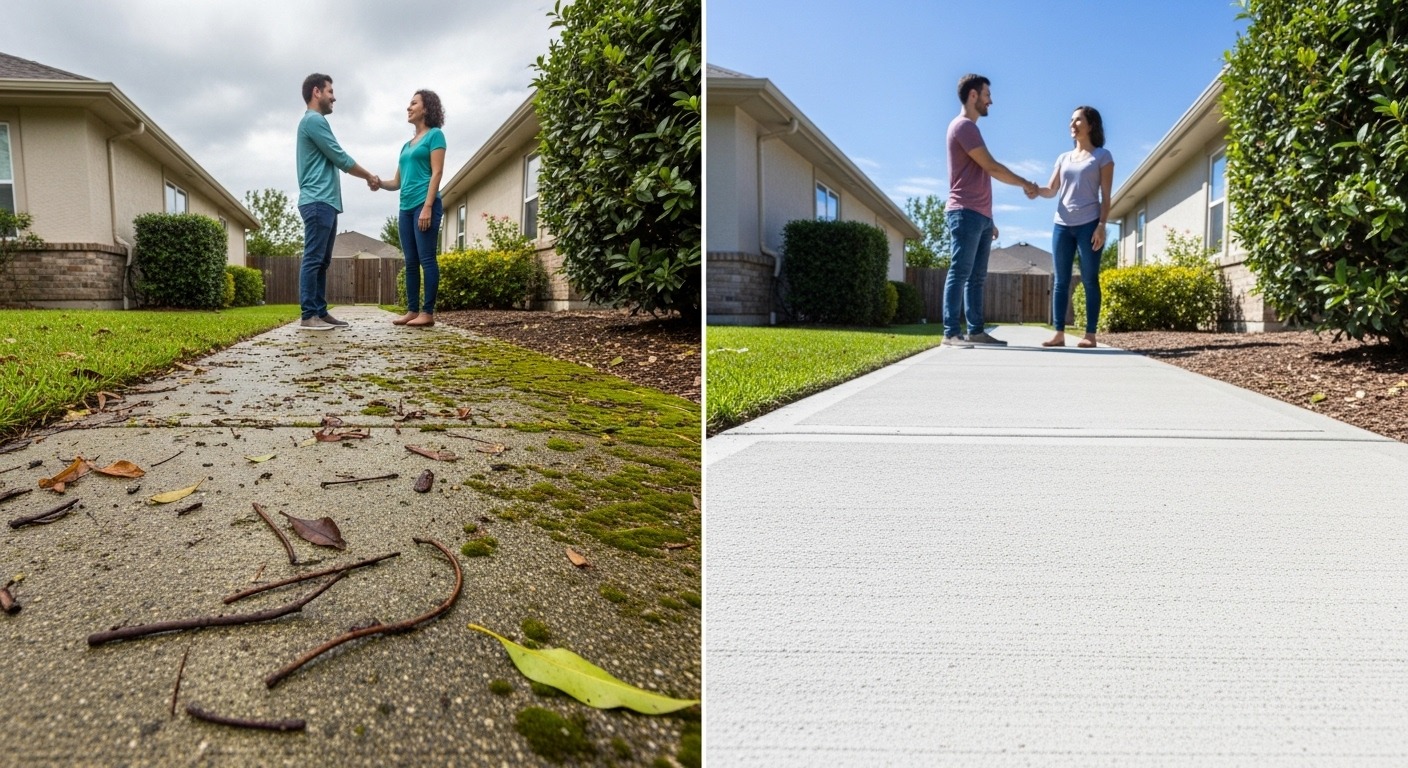Worried about maintenance disputes with your new laneway house neighbor? Vancouver’s aggressive housing densification has created thousands of shared maintenance scenarios that often lead to costly legal battles and damaged relationships between property owners.
Picture this: You’ve just invested in a beautiful laneway house property, excited about Vancouver’s innovative approach to housing density. Six months later, you’re locked in a heated dispute with your neighbor about who’s responsible for pressure washing the shared driveway, cleaning moss off the walkway, and maintaining the property boundaries. Sound familiar? You’re not alone—Vancouver’s push toward density housing through laneway homes, multiplexes, and infill development has created an unexpected consequence that’s catching homeowners off guard.
The city has issued over 3,300 laneway house permits since expanding the program city-wide, with each new unit creating complex maintenance scenarios between primary and secondary dwelling owners. What seemed like a straightforward solution to Vancouver’s housing crisis has morphed into a legal minefield where unclear boundaries, shared responsibilities, and conflicting interpretations of municipal bylaws are turning neighbors into adversaries. The good news? Most of these disputes are completely preventable with the right maintenance strategy.
Traditional single-family lots weren’t designed for multiple dwelling units, and Vancouver’s rapid densification has outpaced the development of clear maintenance protocols. Property owners find themselves navigating an intricate web of strata property laws, municipal maintenance bylaws, and informal agreements that often leave everyone confused about who’s responsible for what. The result is a surge in neighbor disputes that could have been avoided with proactive planning and regular maintenance schedules.
Key Outtakes:
- Vancouver has issued over 3,300 laneway house permits, creating thousands of new shared maintenance scenarios that often lead to disputes
- Strata corporations are legally required to maintain common property under BC’s Strata Property Act, but enforcement varies significantly across developments
- Municipal bylaws require property owners to maintain buildings free from hazard, with fines ranging from $250 to $10,000 for non-compliance
- Regular pressure washing of property boundaries can prevent most neighbor disputes related to exterior maintenance issues
- Metro Vancouver’s water restrictions can disrupt maintenance schedules and exacerbate existing property disputes between neighbors

Vancouver’s Density Housing Boom Creates Maintenance Confusion

The transformation of Vancouver’s residential landscape has been nothing short of dramatic. What started as an innovative solution to the housing crisis has evolved into a complex web of maintenance responsibilities that many property owners never anticipated. The city’s aggressive densification strategy, targeting 4,000 new laneway houses over the next decade under the Housing Vancouver Strategy, has fundamentally changed how we think about property maintenance and neighbor relationships.
Each new laneway house permit represents more than just additional housing—it creates an entirely new maintenance ecosystem where traditional property boundaries become blurred. Unlike purpose-built multi-family housing with established strata corporations and clear maintenance protocols, these infill developments often operate in a legal gray area. Property owners who previously managed simple single-family maintenance find themselves negotiating complex shared responsibilities with neighbors they barely know.
The situation becomes even more complicated when you consider Vancouver City Council’s exploration of separate ownership options for laneway homes. As pointed out in recent policy discussions, Vancouver is examining subdivision and stratification models similar to Seattle’s program, which resulted in increased housing production but also a surge in maintenance-related disputes. The prospect of true separate ownership sounds appealing until you realize it means potentially dealing with mortgage companies, insurance providers, and municipal authorities who all have different interpretations of maintenance responsibilities.
What makes Vancouver’s situation unique is the speed of implementation. While other cities gradually introduced density housing with comprehensive maintenance frameworks, Vancouver’s urgent housing needs led to rapid deployment of laneway house programs without fully anticipating the maintenance nightmares that would follow. Property owners who enthusiastically embraced densification now find themselves spending more time mediating maintenance disputes than enjoying their investments.
The infrastructure reality adds another layer of complexity. Despite common concerns about infrastructure costs, research shows that dense housing actually costs municipalities less to maintain—apartments require five to nine times less infrastructure investment per capita than single-family homes. However, this cost efficiency doesn’t translate to simpler maintenance when density is achieved through infill development rather than purpose-built multi-family housing. Instead, property owners face the worst of both worlds: complex shared maintenance responsibilities without the structured governance systems that make traditional strata living manageable.
The Legal Maze of Shared Property Maintenance Responsibilities
Navigating the legal requirements for shared property maintenance feels like trying to solve a puzzle with pieces from different boxes. Vancouver’s property owners must simultaneously comply with provincial strata property laws, municipal maintenance bylaws, and often informal agreements that may not hold up under legal scrutiny. Understanding these overlapping jurisdictions is crucial for preventing disputes and protecting your investment.

Under BC’s Strata Property Act, strata corporations bear clear responsibility for maintaining and repairing common property, including exterior building elements like doors, windows, and skylights. The law explicitly states that strata corporations cannot adopt bylaws requiring individual owners to maintain common property—a protection designed to prevent cost-shifting onto reluctant owners. However, many laneway house developments operate under co-ownership arrangements or informal agreements that don’t provide the same legal protections as formal strata corporations.
Municipal enforcement adds another dimension to the maintenance equation. Vancouver’s Standards of Maintenance Bylaw 5462 requires all building owners to maintain properties “free from hazard,” with fines ranging from $250 to $10,000 for violations. Bylaw officers can issue cleanup notices with specific deadlines, and failure to comply can result in the city performing the work and billing property owners for costs plus administrative fees.
The challenge emerges when municipal standards conflict with informal maintenance agreements between neighbors. A property owner might assume their laneway house arrangement exempts them from certain municipal requirements, only to discover that bylaw officers hold all property owners equally responsible for maintaining shared areas. This creates a scenario where one neighbor’s neglect can result in fines for multiple parties, leading to bitter disputes about cost recovery and future maintenance protocols.
Property line and encroachment issues further complicate the legal landscape. BC’s Partition of Property Act provides a nuclear option for resolving irreconcilable maintenance disputes—forced sale of the entire property. Courts consider “significant hardship” when evaluating these applications, particularly relevant for seniors who joined laneway house arrangements expecting simplified living. The possibility of losing your home due to a maintenance dispute with a co-owner represents the ultimate nightmare scenario that proactive maintenance planning can prevent.
Smart property owners are learning to document everything. Maintenance schedules, cost-sharing agreements, and communication with neighbors create crucial legal protection if disputes escalate. Professional maintenance services provide additional protection through liability insurance and documented service records that courts recognize as evidence of responsible property stewardship. The key is establishing clear protocols before problems arise, not trying to negotiate solutions in the middle of a crisis.
How Preventative Pressure Washing Stops Disputes Before They Start
The most effective way to prevent maintenance disputes is surprisingly simple: regular pressure washing that addresses problems before they become sources of conflict. Vancouver’s climate creates perfect conditions for the organic growth and debris accumulation that typically trigger neighbor disputes, making preventative cleaning essential for maintaining property relationships and values.

Vancouver’s 160+ rainy days annually create ideal conditions for mold, mildew, and algae growth on exterior surfaces. What starts as minor discoloration quickly evolves into slippery walkways and unsightly building exteriors that affect everyone’s property values. Professional pressure washing companies consistently recommend annual cleaning for driveways and walkways, with siding maintenance every 1-2 years to address Vancouver’s specific climate challenges. This proactive approach prevents the accumulation of organic matter that commonly becomes the focal point of neighbor disputes.
The liability protection aspect of regular pressure washing cannot be overstated. Moss and algae buildup on shared walkways creates slip-and-fall hazards that expose all property owners to potential lawsuits. When multiple parties share responsibility for common areas, the legal exposure multiplies—one person’s neglect can result in liability claims against everyone. Regular professional cleaning eliminates these hazards while providing documented evidence of responsible maintenance practices.
Coordinated cleaning schedules offer significant advantages for multi-unit properties. Rather than individual property owners arranging separate cleaning services that may conflict or leave areas uncleaned, professional coordination ensures comprehensive coverage of all exterior surfaces. Research on pressure washing business operations indicates that companies can offer discounts for bundled services at adjacent properties, creating a financial incentive for neighbors to cooperate on maintenance schedules. This approach not only saves money but also fosters a sense of shared responsibility that can de-escalate potential conflicts.
Property lines and fences represent another common flashpoint for disputes. Moss, algae, and dirt don’t respect property boundaries, and discoloration that starts on one side of a fence quickly spreads to the other. Regular pressure washing along shared property lines keeps these visual markers clean and well-maintained, eliminating a major source of neighbor complaints. It’s a simple, proactive step that demonstrates a commitment to maintaining community aesthetics and preventing the “us vs. them” mentality that fuels so many disputes.
Water Restrictions and the Seasonal Maintenance Clock
Metro Vancouver’s seasonal water restrictions add a critical time-sensitive element to property maintenance planning. For property owners already struggling to coordinate shared maintenance, these regulations create an urgent deadline that can either force cooperation or escalate existing tensions. Understanding how these restrictions impact exterior cleaning is essential for staying compliant and keeping the peace.

During Stage 1 restrictions, which typically run from May to October, pressure washing is only permitted with a permit for health and safety reasons or to prepare a surface for painting. Professional pressure washing companies that use less than 2,500 liters of water per day and have a water-use management plan are generally exempt, allowing them to continue operating. This professional exemption becomes a critical lifeline for property owners who need to address maintenance issues during the summer months.
The problem arises when neighbors can’t agree on a maintenance plan before restrictions take effect. One property owner might want to address a growing moss problem in April, while another wants to wait until summer. When water restrictions kick in, the window of opportunity for DIY pressure washing closes, forcing owners to either hire a professional or let the problem fester until fall. This delay can turn a minor issue into a major source of conflict, with one neighbor blaming the other for missing the maintenance window.
Coordinating professional services well before the start of water restriction season is the smartest strategy. Reputable pressure washing companies see a surge in demand during the spring as property owners rush to beat the deadline. Booking services in March or April ensures you get on the schedule and avoids the last-minute scramble that can lead to higher prices and limited availability. For laneway house owners, this means initiating conversations with neighbors in late winter to agree on a scope of work and a cost-sharing arrangement.
The seasonal clock also impacts property values and liability. A slippery, moss-covered walkway that was a minor annoyance in March becomes a significant liability risk by July, especially in a high-traffic shared area. Postponing maintenance due to neighbor disagreements or a misunderstanding of water restrictions doesn’t eliminate the risk—it amplifies it. Proactive, coordinated maintenance planning that accounts for Metro Vancouver’s water use regulations is not just about keeping properties clean; it’s a fundamental part of risk management in a densified housing environment.
Frequently Asked Questions About Shared Property Maintenance
Who is responsible for maintaining a shared driveway in a laneway house setup?
Responsibility for a shared driveway is typically outlined in a co-ownership or maintenance agreement. If no formal agreement exists, all property owners who use the driveway are generally considered jointly responsible for its upkeep under common law principles. This includes activities like pressure washing, snow removal, and crack repair. It’s highly recommended to create a written agreement to avoid disputes.
Can I be fined by the city if my neighbor doesn’t maintain their side of the property?
Yes. Under Vancouver’s Standards of Maintenance Bylaw, municipal officers can hold all registered owners of a property responsible for violations, especially concerning common or shared areas. If your neighbor’s neglect creates a hazard (like a slippery walkway) that extends into a shared space, you could both be subject to fines and cleanup orders from the city.
How often should shared exterior surfaces be pressure washed in Vancouver?
Due to Vancouver’s damp climate, professional pressure washing companies recommend an annual cleaning schedule for high-traffic surfaces like driveways and walkways to prevent moss and algae buildup. Building exteriors, such as siding and fences, should typically be cleaned every 1-2 years to maintain their appearance and structural integrity.
What happens if we can’t agree on a maintenance schedule during water restriction season?
If you miss the window for DIY pressure washing before water restrictions begin, your primary option is to hire a professional company that meets the exemption criteria. If a neighbor refuses to cooperate, you may need to document the hazard (e.g., slippery moss), send a formal written request for maintenance, and if necessary, consult a legal professional to understand your options for compelling action or recovering costs.
Does strata insurance cover damage from lack of maintenance in a laneway home?
It depends on the specific policy and the nature of the co-ownership arrangement. Standard strata insurance policies often exclude damage resulting from gradual deterioration or lack of regular maintenance. For laneway homes without a formal strata corporation, individual homeowner policies may also deny claims related to shared property if negligence or failure to maintain can be proven. Proactive, documented maintenance is the best way to ensure coverage.
Wrapping Up: Proactive Maintenance Protects Your Investment
Vancouver’s housing densification is a reality, and with it comes a new era of shared property maintenance. The days of simply managing your own single-family lot are over for thousands of property owners. The key to navigating this new landscape isn’t hoping for the best—it’s implementing a proactive, documented maintenance strategy that anticipates problems before they escalate into costly disputes.
Regular pressure washing, coordinated schedules, and clear written agreements are no longer optional extras; they are essential tools for protecting your investment and maintaining positive relationships with your neighbors. By understanding the legal framework and taking preventative action, you can avoid the legal minefield of shared maintenance and enjoy the benefits of living in one of Canada’s most dynamic and evolving cities.

